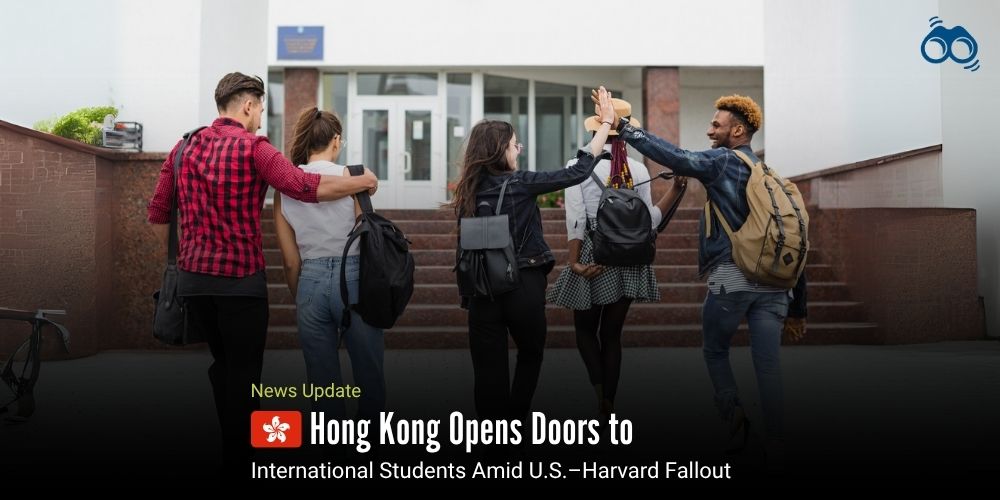Global Power Shift in Academia: U.S. Policies Open Doors for Hong Kong
Hong Kong Steps Up as U.S. Restricts International Student Admissions
In an era of shifting global education dynamics, international students continue to be a vital force in academic institutions and national economies. Despite recent policy changes in the United States, foreign students remain a significant presence, with approximately 880,000 enrolled in U.S. colleges during the 2024-25 academic year. However, the U.S. government’s controversial decision to block Harvard from admitting foreign nationals has sparked concerns, as many view it as an extension of President Donald Trump’s ongoing dispute with the institution.
In direct response to this development, Hong Kong has reportedly announced plans to expand international student enrolment across its universities. By positioning itself as an alternative destination for students affected by U.S. restrictions, Hong Kong is challenging the dominance of American institutions while reinforcing its commitment to fostering global academic exchange. As tensions between Washington and Beijing continue to extend beyond trade and diplomacy, the higher education sector finds itself caught amid political manoeuvring, with students and universities forced to navigate an increasingly uncertain landscape.
The U.S. government's action has not only raised concerns about the future of thousands of foreign students who rely on American universities for their education but has also cast doubt on the financial sustainability of institutions dependent on international student contributions. Against this backdrop, Hong Kong’s proactive approach seeks to fill the void, offering affected students new opportunities while strengthening its role in global education. Following the U.S. decision to block Harvard from admitting foreign students, an action temporarily halted by a judge, Hong Kong’s Education Secretary Christine Choi urged local universities to open their doors to international applicants. Moreover, the Education Bureau encouraged institutions to implement support measures and highlighted relaxed caps on foreign admissions as a way to attract more students to the city.
One notable response came from the Hong Kong University of Science and Technology (HKUST), which extended an invitation to international students previously enrolled at or admitted to Harvard. Offering unconditional admission, streamlined processes, and academic support to ensure continuity, HKUST is attempting to ease the transition for affected students. While Harvard ranks first globally, HKUST stands at 105th, making this a significant shift for those seeking alternatives. The move follows President Trump’s reported frustration with Harvard for resisting government oversight, accusing the university of promoting anti-Semitism and liberal ideology.
On 23 May, a U.S. judge temporarily blocked the administration’s attempt to prevent Harvard from admitting foreign students, ruling the government’s action unlawful. Meanwhile, U.S. Homeland Security Secretary Kristi Noem defended the administration’s stance, alleging that Harvard fostered violence, anti-Semitism, and collaborated with the Chinese Communist Party on campus.
Beijing swiftly condemned the move, calling it the "politicisation of educational cooperation" and warning that Washington’s actions would damage the United States’ international reputation. According to university data, roughly 1,300 Chinese students, representing one-fifth of Harvard’s international student population, are currently enrolled at the institution. Furthermore, hundreds of thousands of Chinese students attend other U.S. colleges and universities, which are widely regarded in China as centres of academic freedom and excellence. With these developments unfolding rapidly, the global higher education sector remains in a state of flux, and the long-term impact of these policies on students and institutions alike remains uncertain.
Editor’s Note:
The U.S. government's move to stop Harvard from admitting foreign students, whether due to national security concerns or political reasons, has caused a major stir in the academic world. This policy change could seriously damage the reputation of American higher education and weaken its financial base, as international students contribute billions in tuition fees to local economies. With nearly 880,000 foreign students currently studying in the U.S., any big drop in numbers could have lasting effects on universities already facing financial pressure. International students also bring fresh ideas, talent, and research skills, especially in science and technology, areas where the U.S. has traditionally been a global leader. A continued fall in foreign enrollment could harm the academic quality and global standing of U.S. institutions. In contrast, Hong Kong has acted quickly, inviting more international students and positioning itself as a growing force in global education. While it doesn’t yet match the prestige of Harvard or top U.S. universities, this shift could encourage students to choose Hong Kong instead. If Hong Kong can protect academic freedom, fund research well, and build strong international ties, it may become an increasingly attractive option.
Skoobuzz highlights that this situation shows how political decisions can have wide-ranging effects. Whether the U.S. sticks to these restrictive policies or changes course, the world is paying attention because once top students start looking elsewhere, winning back their trust and leadership in education won’t be easy.














0 Comments (Please Login To Continue)